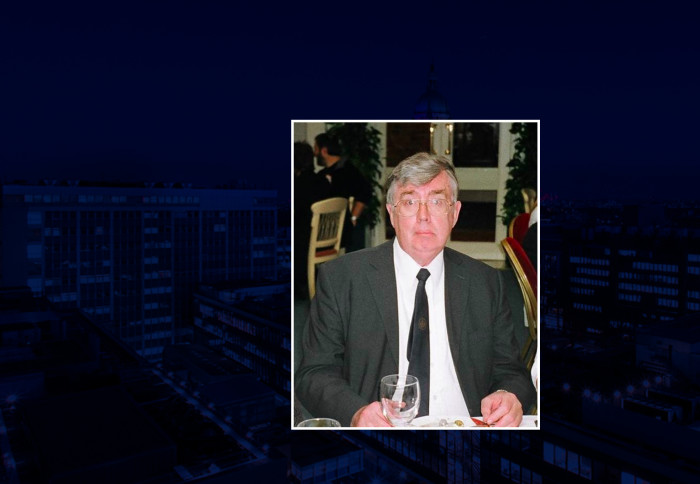Professor Ernie Freeman
by Jane Horrell

We recently received the sad news that our former colleague Professor Ernie Freeman passed away in May, aged 84.
Ernie retired from the Department in 2005, but he is remembered by many of us as a warm and entertaining colleague, and a generous mentor to junior staff.
A tribute in the UK Magnetics Society Bulletin describes him as "a leader in an era which spanned the “last days of analysis” and the “dawn of numerical methods”, Ernie was a principal architect of the theory and development of the CAD systems used to create electrical machines and magnetic devices today, co-founding Infolytica in 1978 as a means of making them available to everyone. He had an immense depth of the history of the subject, not so much in the shop-window of famous inventions but in the brilliant analytical work of several giant figures."
Remembering a hearty Fellow
Professor Tim Green
Ernie was a distinguished pioneer of computational electromagnetic design. Born in London 1937, he was an evacuee to Wales during the war, a country he returned to often and to where he eventually retired.
He studied electrical engineering at King’s College London and was a graduate apprentice at AEI Rugby. He returned to King’s College for a PhD in electromagnetics and was then appointed to a lectureship. It is often remarked that his initials were a case of nominative determinism. In 1970 he became a reader at Brighton Polytechnic and worked on a variety of electrical machine innovations including levitating machines.
He was recruited to Imperial College to work with Eric Laithwaite in 1973. At Imperial he became interested in computational solvers for electromagnetic problems and made extensive use of the college mainframe to develop and use codes.
He was as much an innovator as an academic and in 1978, with former PhD student Dave Lowther and Canadian collaborator Peter Silvester, formed Infolytica to commercialise design software optimised to run on low-cost computers. The company was very successful and the software, Magnet, continues as part of the Mentor design suite owned by Siemens.
Ernie was the founder of two conferences — Compumag in 1976 and Marelec. The latter focused on marine applications of electromagnetics and reflected Ernie’s role in defence applications of electromagnetics.
He was promoted to professor in 1981 and was proud to have been elected Fellow of the Royal Academy of Engineering in 1987. He never stopped thinking about engineering and was publishing until the end.
Ernie had a huge range of interests including the architecture of terraced houses and of Saxon churches. He was a lover of fine wine, a great story-teller and in possession of a devilish sense of humour.
He took a genuine interest in his junior colleagues. He heartily congratulated others on their success but more importantly he also noticed and quietly reassured people who had a disappointment. His classic advice was to celebrate success with a good wine and banish disappointments with a great wine. But he gave much more advice than that and was an important mentor before that word was in common use in academia.
His jovial presence, his depth of knowledge and his warm heartedness will be missed by many. Ernie is survived by his wife Helen and nieces Beth and Jo.
Ernie's family has set up an online memorial page, to share memories and collect donations for the Stroke Association in lieu of flowers.
All those who remember Ernie as a colleague or student are also invited to share their own tributes and memories through the comments section below.
Article text (excluding photos or graphics) © Imperial College London.
Photos and graphics subject to third party copyright used with permission or © Imperial College London.
Reporter
Jane Horrell
Department of Electrical and Electronic Engineering